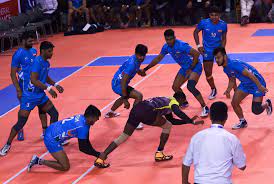Kabbadi has come a long way from the villages of Punjab to become an international sport. It is played in several states in India. It is the national sport of Bangladesh and Nepal. It is now being played in over fifteen countries. But it is still a long way to become an Olympics game. One of the main reasons is the abuse of drugs by players from the state which often leads on Kabbadi, Punjab.
The Olympics Governing Body has told the Kabbadi lobby that they need to be played with unitary rules in 75 countries before they can be considered for the Olympics. There are attempts to spread the game around the world in order to make a serious bid.
It is enthusiastically played in India, Nepal, Pakistan, Bangladesh, Japan, Sri Lanka, Thailand, Malaysia, Iran, Korea, Argentina, Canada, U.K, Italy, China, Trinidad and Tobago, and Australia. In UK England, Scotland and Wales have their own teams.
But one of the issues holding back a serious bid to become an Olympics game is the extent of drugs being used in the game. There is apprehension that too many players may fail the strict drugs test to qualify at Olympics. Enthusiasm for the game is sullied by the reputation it has achieved as a drug infested game.
In the last ten years there are numerous examples of doping. In March 2010, 13 members of the Indian national team were dropped because they tested positive to banned drugs. The incident both shocked and shamed the country.
But soon after, in November 2011, BBC reported that 18 out of some 45 players had tested positive to banned drugs at the World Kabbadi tournament. The players were from various countries including the US, Australia, Canada, the UK, Norway, Italy, Argentina, Spain and Germany.
In January 2014, several players from outside India failed to turn up for the annual Kabbadi tournaments. Jagdish Bholla, a cop turned drug lord, had given the names of several players doubling as ‘mules’ who smuggle drugs. These players were put on the watch list, to be arrested as soon they landed in Punjab.
The latest scandal in Kabbadi was Amritpal Singh Matta, a police officer and renowned international player in Kabbadi. He admitted to taking drugs since 2008 but blames the police force, in which he works. He blatantly claims that he started taking drugs from within the police stations. He has been suspended from duty.
These are only some of the reported cases. But when 25% of a team is tested positive for prohibited drugs, the game needs serious cleaning up. And when players are accused of being drug mules, the game naturally comes under the scanner. Its chances of gaining status at the Olympics is almost zero.
Drugs have taken over the lives of Punjabis. They are everywhere. Not only in Punjab, but almost everywhere around the world where Punjabis go, drugs seem to find a foothold. Both the regional and national Government need to come with a comprehensive programme to address them. While drugs have taken many lives in India, their widespread prevalence in the Kabbadi players of India is enough to take strong action to eradicate drugs from South Asia.
